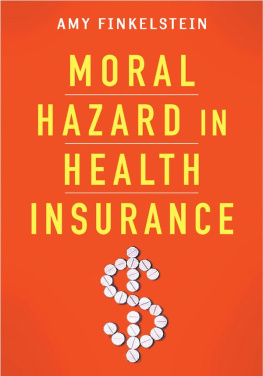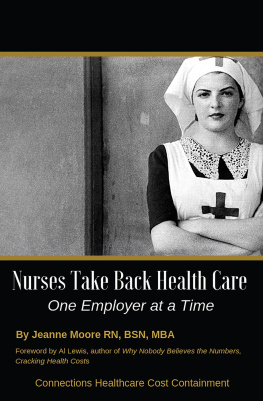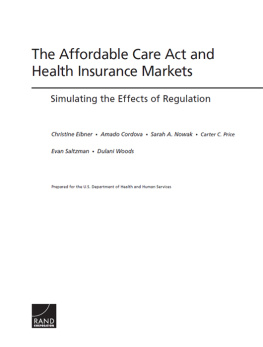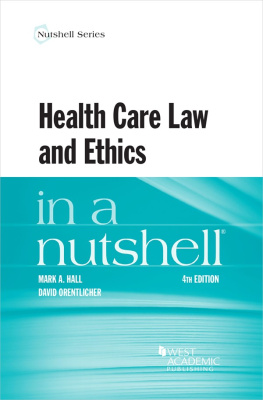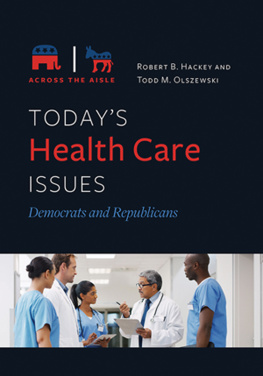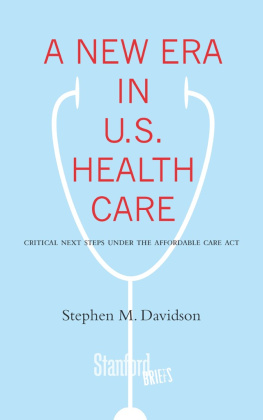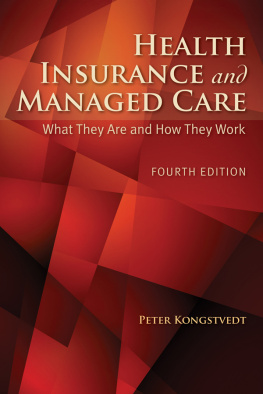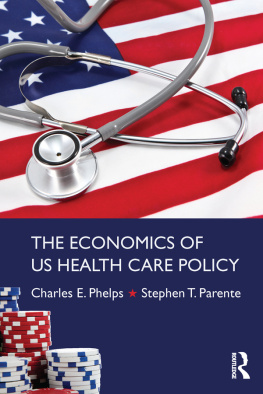MORAL HAZARD IN HEALTH INSURANCE
KENNETH J. ARROW LECTURE SERIES
KENNETH J. ARROW LECTURE SERIES

Kenneth J. Arrows work has shaped the course of economics for the past sixty years so deeply that, in a sense, every modern economist is his student. His ideas, style of research, and breadth of vision have been a model for generations of the boldest, most creative, and most innovative economists. His work has yielded such seminal theorems as general equilibrium, social choice, and endogenous growth, proving that simple ideas have profound effects. The Kenneth J. Arrow Lecture Series, supported by the Committee on Global Thought and the Program for Economic Research, highlights economists, from Nobel laureates to groundbreaking younger scholars, whose work builds on Arrows scholarship as well as his innovative spirit. The books in the series are an expansion of the lectures that are held in Arrows honor at Columbia University.
Creating a Learning Society: A New Approach to Growth, Development, and Social Progress , Joseph E. Stiglitz and Bruce C. Greenwald
The Arrow Impossibility Theorem , Eric Maskin and Amartya Sen
Speculation, Trading, and Bubbles , Jos A. Scheinkman
MORAL HAZARD IN HEALTH INSURANCE
AMY FINKELSTEIN
WITH
KENNETH J. ARROW,
JONATHAN GRUBER,
JOSEPH P. NEWHOUSE,
AND JOSEPH E. STIGLITZ
COLUMBIA UNIVERSITY PRESS | NEW YORK
Columbia University Press
Publishers Since 1893
New York Chichester, West Sussex
cup.columbia.edu
Copyright 2015 Columbia University Press
All rights reserved
E-ISBN 978-0-231-53868-8
Library of Congress Cataloging-in-Publication Data
Finkelstein, Amy.
Moral hazard in health insurance / Amy Finkelstein.
pages cm. (Kenneth J. Arrow lecture series)
Includes bibliographical references and index.
ISBN 978-0-231-16380-4 (cloth : alk. paper)
ISBN 978-0-231-53868-8 (ebook)
1. Health insurance. 2. Moral hazard. 3. Risk (Insurance) I. Title.
HG9383.F56 2014
368.382dc23
2014011303
A Columbia University Press E-book.
CUP would be pleased to hear about your reading experience with this e-book at .
Cover design: Noah Arlow
References to websites (URLs) were accurate at the time of writing. Neither the author nor Columbia University Press is responsible for URLs that may have expired or changed since the manuscript was prepared.
CONTENTS
by Joseph E. Stiglitz
T his book grew out of the fifth annual Kenneth J. Arrow Lecture that took place in April 2012. This series honors one of Columbias most distinguished graduates, Kenneth J. Arrow. Each years lecture focuses on the intellectual developments that have arisen from one of his many seminal contributions to the discipline. Over the past six years, the lecture series has covered a huge variety of topics, just as Kens work has. The books in the Kenneth J. Arrow Lecture Series are all based on one of these lectures.
The first lecture, which Bruce Greenwald and I delivered, followed up on Kens 1962 paper on learning by doing. That lecture led to a book published in 2014 by Columbia University Press, Creating a Learning Society: A New Approach to Growth, Development, and Social Progress .
focused on Kens Ph.D. thesis, published as Social Choice and Individual Values in 1951. Maskin and Sens lecture formed the basis of the second book in the series, The Arrow Impossibility Theorem (2014). The third book, Speculation , Trading, and Bubbles (2014), was based on a lecture by Jos A. Scheinkman. Scheinkman considered Arrows fundamental work on general equilibrium, where he introduced the concept of what is now called Arrow-Debreu securities, revolutionizing thinking about financial markets.
The fourth lecture was on global warming, a subject about which Arrow has felt passionately. He served with me on Working Group III of the 1995 Assessment of the International Panel on Climate Change (IPCC), and we wrote a paper, together with several of our other colleagues in the working group, on the effect of uncertainty on the appropriate rate of discounting, to take into account the future costs of global warming. Sir Partha Dasguptas lecture, Persons and Time in the Welfare Economics of Climate Change, further pursued the question of the appropriate responses to the threat of global warming. (The sixth Arrow lecture, delivered by Christian Gollier, also considered the economics of discounting, and the books based on his lecture and on Dasguptas are forthcoming.)
(Another is adverse selection. His 1965 Jahnsson lecture, Aspects of the Theory of Risk Bearing, highlighted the importance of both of these.) His 1963 paper was a seminal contribution both to the economics of (health) insurance and to the theory of moral hazard. It launched two huge bodies of literature. We were pleased that one of the major young contributors to that literature accepted our invitation to deliver the fifth Arrow lecture.
The questions Ken raised are still front and center in one of todays central policy issues, the provision of health insurance. Prior to the passage of the Affordable Care Act (commonly called Obamacare), more than 50 million Americans lacked health insurance. Americas poor health performance is partially the result of this deficiency.
The talk provided an opportunity to connect some of these policy issues with basic economic research.
Amy Finkelstein is Professor of Economics at MIT, Co-Director of the Public Economics Program at the National Bureau of Economic Research, and Co-Editor of the Journal of Public Economics , which I helped found many years ago. Her research in public finance and health economics focuses on market failures and government intervention in insurance markets and the impact of public policy in the healthcare sector.
This volume includes not only Amys lecture but also the commentaries of its discussants. The first is Jonathan Gruber, who is also a Professor of Economics at MIT and Co-Director of the Healthcare Program at the National Bureau of Economic Research. He has been involved in health economics for a very long time and has won a number of awards for his work, including an Inaugural Medal for Best Health Economist Age Forty and Under from the American Society of Health Economists in 2006, and the National Institute for Health Care Management Foundation Health Care Research Award in 2012. He has also served as Deputy Assistant Secretary for Economic Policy at the Treasury Department. He did important work on the Massachusetts Healthcare Reform, which was the prototype for the Affordable Care Act.
I served as the second discussant.
Our third discussant is Ken Arrow himself. One of the wonderful aspects of the Arrow Lecture is that Ken graciously agrees to comment on the talk, and that is always an exciting moment, because it reflects both how he thought about the problem many years ago and how thinking about these debates has evolved over subsequent decades.
Joseph P. Newhouse has also graciously provided an introduction to this volume, which provides context for the ensuing discussion. Newhouse was one of the leaders of the famous RAND Health Insurance Experiment, and of the landmark Oregon Health Insurance Experiment, which Amy discusses later in this book. In 2014, he received the Victor R. Fuchs Lifetime Achievement Award from the American Society of Health Economists, in recognition of his pioneering work in the field.

